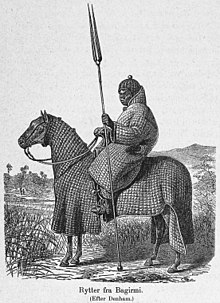Baguirmi Sultanate
Bagirmi (also Baguirmi ) was an Islamic sultanate that existed in central Africa from around 1480 to 1897.
It extended southeast of Lake Chad in the area of what is now the state of Chad . The Bagirmi Empire came into being in the southeast of the old Kanem Bornu Empire. The first handed down ruler (title: Mbang "King") is mentioned in 1522 and still owed tribute to the Kanem-Bornu. Islam was introduced under the rule of Abdullah IV (1568-1608), who made the empire a sultanate. The title "Mbang" was retained for a long time alongside the sultan's title. Later, a sultan's palace was built in the capital, Massenya , and a court of justice was established. The official language was the Bagirmi language (also: Barma ).
history
Bagirmi's political role resulted from his relationship with his more powerful neighbors. While under the Kanem-Bornu ruler Idris Alooma (1571-1603) the Bagirmi Empire was practically subject to this, it achieved a certain degree of independence in the 17th century, but became a tribute-dependent vassal state of Kanem-Bornus again in the 1750s. In times of its own strength, Bagirmi was able to achieve a certain regional supremacy and even subjugate neighboring peoples, make alliances with other nomadic peoples, and control trade in the area around Lake Chad. The empire covered an area of up to 200,000 km²; the locals mainly settled in the area around the Schari River and practiced mainly cattle breeding. Cotton strips (farda) served as a means of payment. Early 19th century Then began the decline of the Bagirmi empire, which finally had to submit to the Wadai , who offered help in internal conflicts. The German Africa explorer Heinrich Barth arrived in the area in 1852 and Gustav Nachtigal in 1872 after the Wadai had devastated the country. In 1893 the Sudanese warlord Rabih b. Fadlallah to Massenya, which he had burned down. Thereupon the 25th Sultan of Bagirmi, Abd ar Rahman Gwaranga, asked for protection from France , which from 1897 exercised the protectorate over the Bagirmi empire and thus effectively incorporated it into its colonial empire.
The Bagirmi language is still spoken by the locals today; In 1993 there were 44,761 speakers of this language, mainly in the Chadian province of Bagirmi.
swell
- N'Gare, Ahmed (1997) 'Le royaume du Baguirmi (XVe - XXe siècles)'. Hemispheres , 11, 27-31.
- Lebeuf, Annie MD (1978) 'L'ancien royaume du Baguirmi' Mondes et cultures , 38, 3, 437-443.
- Country study Chad

